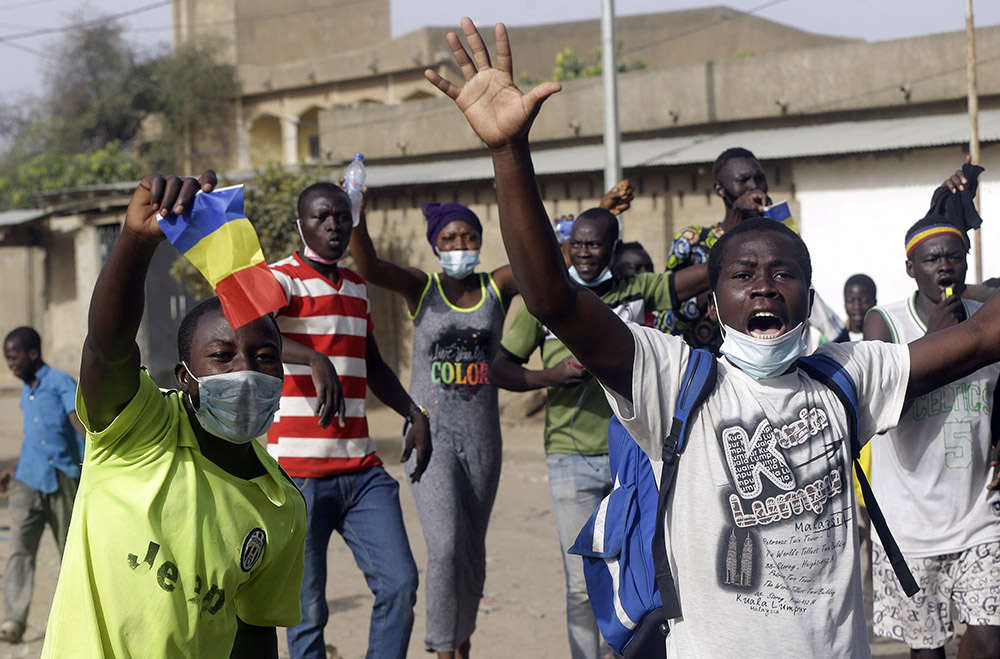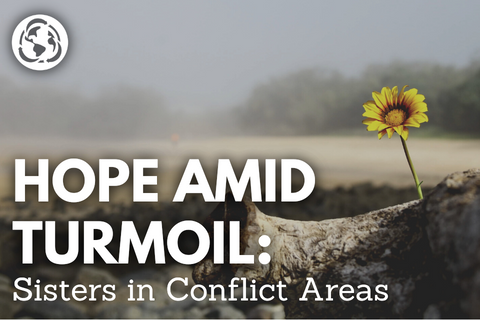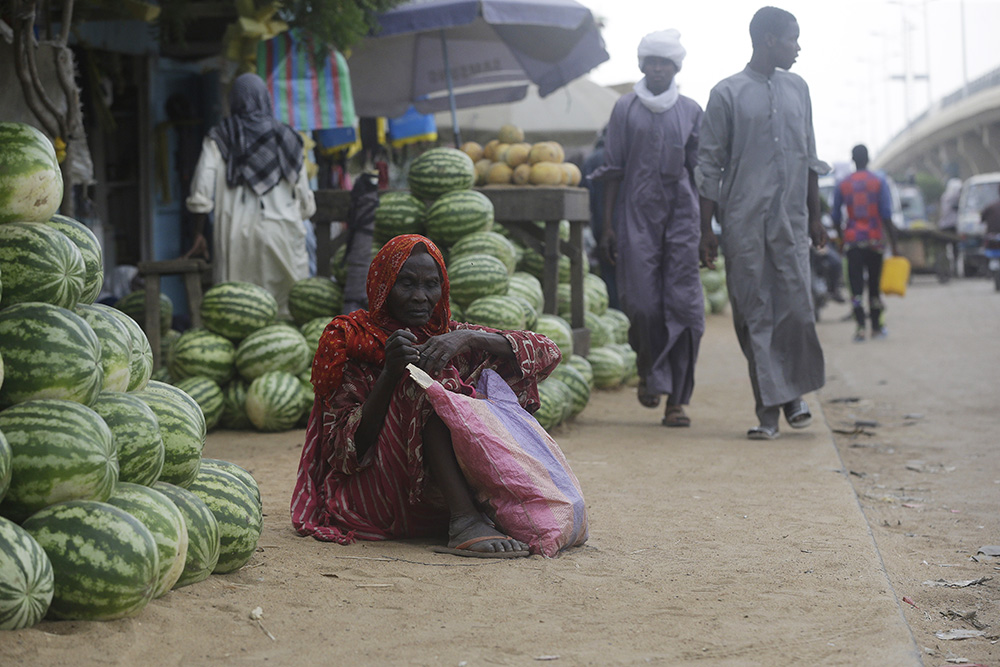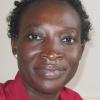
People protest in N'Djamena, Chad, on April 27, 2021, after Mahamat Idriss Déby declared himself the head of the country's Transitional Military Council. (AP/Sunday Alamba)
I have lived my whole life in Chad, a country in the Sahel region of Africa. Chad gained international attention in 2001 when the 6 million-year-old skull of a hominid was discovered. I currently live in a community in N'Djamena, the capital of Chad. In Chadian Arabic, N'Djamena means the "city of rest" or "peace."
Although the name calls for peace, it is, unfortunately, like other cities of our country, a scene of violence and corruption. The current mode of leadership incites unspeakable injustices, including rape and abuses of all kinds.

I was raised a Catholic and eventually became a Religious of the Sacred Heart of Jesus. The sisters worked in our parish, and I was drawn to their way of life.
My father was a veterinarian, and my mother was a social worker. They raised me to be an open and inclusive woman. Our family name, N'guémta, means a mission —a vocation to love universally, seeing every person as brother, sister, father, mother and neighbor.
Being a sister has helped me continue this family mission of addressing the numerous challenges in our beloved country. This calling impels me to embrace the challenge of being a Christian prophet — bearing witness and proclaiming God's message of love and inclusion through my daily life, especially during times of conflict.
We identify as a democratic country, but in reality, we live in a police state. Chadian-style democracy claims the power to veto the life and death of its citizens.
The violence that broke out in October 2022 illustrates this abuse of power. However, violence began in April 2021 when Mahamat Idriss Déby declared himself the head of the Transitional Military Council following the death of his father, who had been in power since 1990.
Déby promised there would be free, fair, and credible elections by October 2022. When it became clear that this would not happen, people began to protest. These actions threatened the government because they didn't know who was organizing the protests.
Advertisement
The security forces of our nation, tasked with protecting the population, responded to the protests by firing live ammunition and tear gas at young, peaceful demonstrators who were only waving tree branches as they marched but were wrongly accused of having weapons.
Many reports documented the killings, with estimates suggesting that the military killed dozens of these youths and injured hundreds in an unprecedented massacre. This event was followed by three months of manhunts, extrajudicial executions, arbitrary arrests, and imprisonment of adults, youth and children in Koro Toro prison.
It was a political ploy that allowed violence of all kinds, including the ransacking of the headquarters of the party of our former prime minister, Albert Pahimi Padacké. However, the blame for these actions was shifted onto the organizers of the protest, the opposition, Waki Tamma, and other political parties.
Our religious community suffered these traumas physically, psychologically, morally and spiritually. We endured the violence in our very flesh. Some of us had difficulty breathing, and our eyes were burned from the gas that was pumped at us. We were all filled with fear, anger, and a deep sense of powerlessness in the face of such injustice.
Despite being deeply demoralized by all of this, we stood before God in an attitude of ardent prayer, keeping our faith, charity and hope. In contrast, the transitional government, which had taken control of the country with promises to organize a "Sovereign and Inclusive National Dialogue," revealed itself as a warlord.
The trauma only intensified as Chadian radio and television broadcast erroneous "official" reports about what had happened — an attempt to sway national and international opinion in favor of the new transitional government. In the name of easing tensions that could lead to civil war in Chad, both national and international opinions colluded with this government's agenda by turning a blind eye to the truth.
Since January of this year, instability has been steadily increasing. We have seen a growing number of refugees from the Central African Republic, Sudan and Niger, along with political and climate refugees from neighboring countries. Internally, there is more land conflict and violence between herders and farmers, and hunger has also escalated.

A woman begs on a street in N'Djamena, Chad, on April 26, 2021. (AP/Sunday Alamba)
There are fears that Chad risks tipping into more violence similar to Sudan, as we observe tanks and petrol leaving Chad for Sudan.
Alongside these political conflicts, households also experience instability because of religious issues. Despite our country's constitution protecting religious freedom, with over half of the population practicing Islam and just under half practicing various forms of Christianity, including a minority of Catholics, interreligious marriages frequently lead to conflict.
One example is that of a Catholic Asian woman I know well. She entered into an arranged marriage with a Chadian Muslim man who was a student in her country. Upon moving back to Chad, she discovered that due to some discrepancy over the payment of the required dowry, the marriage had been fraudulently arranged.
The ensuing conflict between the two families resulted in frequent spousal abuse by the husband and insistence that the couple's 3-year-old daughter undergo female genital mutilation in his family's village. The woman resisted this demand, fled and filed for a civil divorce, which she won.
However, this civil action did not exempt her from their interpretation of Islamic religious law and practice, which recognizes the validity of the marriage and grants her husband ownership over her and her daughter. Without her husband's permission, she cannot leave Chad to return to her own country, and so she currently lives with her daughter in a shelter without support. This conflict appears unsolvable.
Life in conflict is painful and discouraging, and women and children bear the brunt of its many forms. We sisters do our best to support them and many others who are vulnerable. We believe in our mission to live in love and hope, continuing to trust in God, who has been with us all these years through times of conflict and peace.







